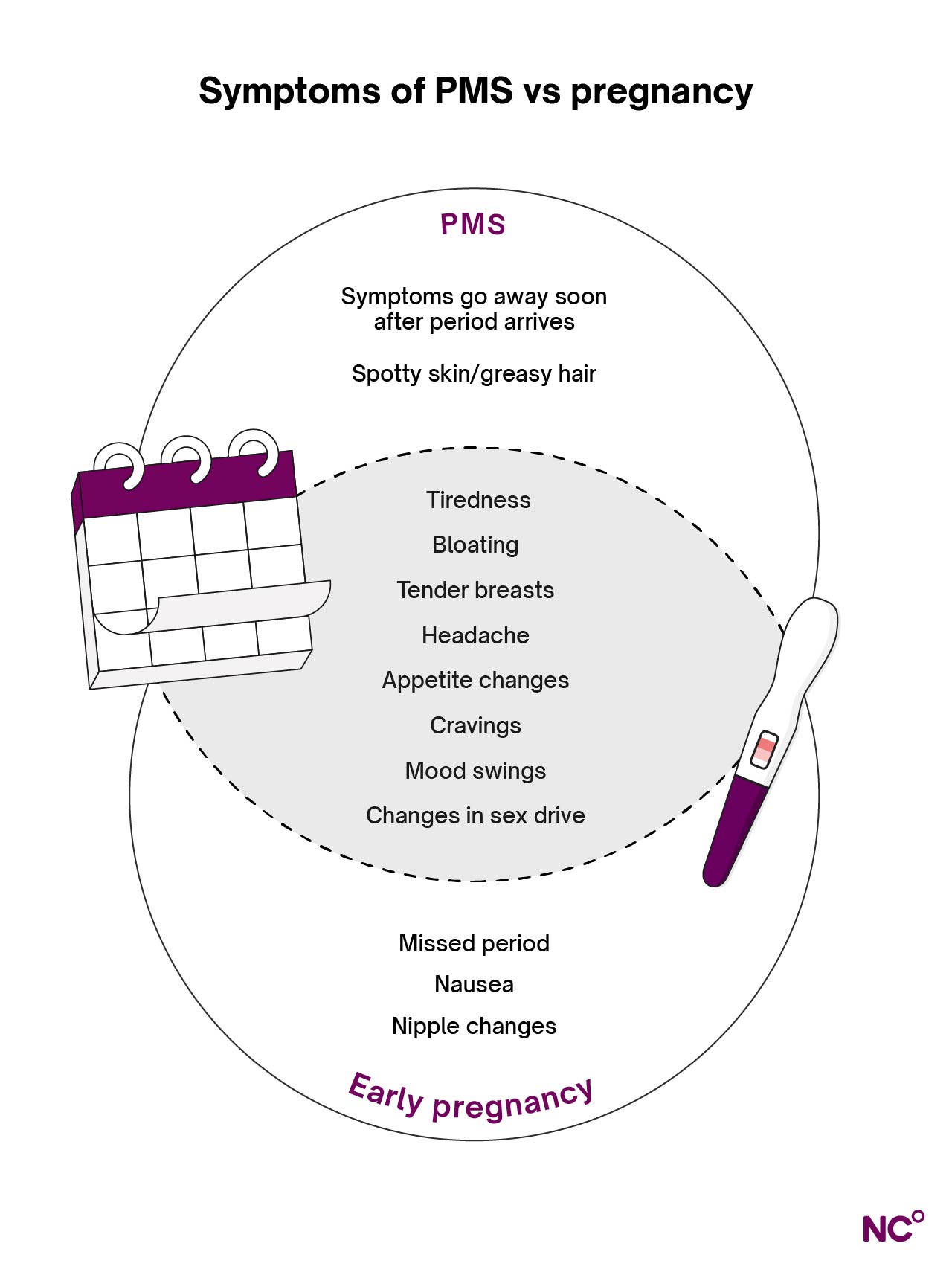Early pregnancy symptoms explained: Spotting the first signs
Follows NC° Editorial Policy
At Natural Cycles, our mission is to empower you with the knowledge you need to take charge of your health. At Cycle Matters, we create fact-checked, expert-written content that tackles these topics in a compassionate and accessible way. Read more...
Key takeaways
- Early pregnancy symptoms can start as soon as a week after conception
- First signs of pregnancy often include nausea, tender breasts, and a missed or light period
- Everyone has their own pregnancy journey, so you may have some, none, or all of the most commonly reported early pregnancy symptoms
- A positive pregnancy test result is the most accurate way to confirm if you’re pregnant
Your body goes through many major changes throughout pregnancy, and these changes can begin as early as within one week of conception [1]. From nausea to sore breasts to strange cravings, we’ll go through some of the most commonly reported early pregnancy symptoms in this article, along with what else may be causing these symptoms besides pregnancy, and when to see your doctor.
While most people experience early pregnancy symptoms within the first eight weeks [2], each pregnancy and each person is unique. With that in mind, you may only have some or none of the most commonly reported symptoms outlined below. It’s still worthwhile to be aware of what’s happening in your body and what you may experience if you’ve just become pregnant.
How early can you spot the first signs of pregnancy?
If you’re noticing some out of the ordinary symptoms or conditions and you’re wondering, “is it even possible to know that I’m pregnant already? ” The answer is yes — early pregnancy symptoms can start as soon as the first week after conception [1]. For some individuals, it can take a few weeks or months for these symptoms to kick in, and for others, they never do.
But either way, by the end of the first week of pregnancy, the fertilized egg has attached itself to your uterine lining and become an embryo (a process called implantation). The cells around the embryo start to link with your body to provide the embryo with the nutrients it needs to grow [3].
Dr. Natalie Crawford, member of the Natural Cycles Medical Advisory Board, shared some insight about the hormonal shifts that can cause early pregnancy implantation symptoms in our bodies. “Once a pregnancy implants, your progesterone levels will increase leading to many of the early pregnancy symptoms. These symptoms can include nausea, lack of appetite, sensitivity to smell, food aversions, enlarged and/or tender breasts, bloating, and fatigue. Every person and every pregnancy is different.”
Could you experience pregnancy symptoms before missing your period?
Yes, you can start experiencing these symptoms before your missed period. Let’s recall that ovulation needs to happen in order for a successful conception to occur, so if you’re pregnant and experiencing symptoms about a week after ovulation, this would be around the time that your luteal phase of the menstrual cycle would normally happen (before your normally scheduled period).
Most common early pregnancy signs & symptoms
Now that we’ve gone through what happens inside of our bodies during early pregnancy and how that causes implantation symptoms, let’s explore the external physical symptoms you may be experiencing as a result of those hormonal shifts. Here are some of the most common early pregnancy symptoms to look out for:
- Missed period or light spotting
- Breast changes
- Frequent urination
- Tiredness
- Strange cravings, tastes, and smells
- Nausea with or without vomiting
- Elevated basal body temperature (BBT)
Now you know what are some common symptoms of early pregnancy — let’s take a closer look at each.
Missed period or light
The most telltale sign of pregnancy is a missed or very light period, especially if you’re usually on a regular cycle. A missed period may mean that the egg cell, and uterine lining that normally would’ve been shed during your period are now supporting an early pregnancy. You may still experience spotting or a light bleed, also known as implantation bleeding, which is thought to happen as the embryo attaches to the uterine lining [4].
Breast changes
You might notice your breasts becoming larger and feeling more tender (or even more sore) than usual. They may also have a tingling sensation, and the veins may be more visible than you’re used to. Your areolas, the area around the nipples, can darken as well. Breast pain is common throughout pregnancy [4].
Frequent urination
Do you find yourself heading to the bathroom much more often? Needing to pee frequently is a common early pregnancy symptom, and it can happen all throughout the day or even at night while you sleep [4].
Tiredness
Exhaustion and tiredness are very common during the first few weeks of pregnancy. This may be due to more frequent sleep disruptions (like needing to use the bathroom), or it may be an effect of the changing hormone levels in your body after implantation [4].
Strange cravings, tastes, and smells
Another telltale symptom that is generally unique to pregnancy is new cravings, which may be accompanied by a change in your sense of taste and smell as well. You may find yourself reaching for foods or drinks you’ve never liked before, or shying away from your go-to favorites. Some people also notice a metallic taste in the mouth, and/or a heightened sense of smell [4].
Nausea
This symptom is most commonly first reported around 4-6 weeks of pregnancy, but it may pop up sooner for you. Also referred to as morning sickness (although it can happen any time of day), you may experience random bouts of nausea if you’re pregnant. It can be severe or mild, and may lead to vomiting or not. Nausea is most common during the first trimester and usually subsides as the pregnancy progresses. There is also a condition called hyperemesis gravidarum, which is a rarer but severe form of nausea and vomiting that requires medical attention [4].
Elevated basal body temperature (BBT)
If you track your BBT regularly, you may notice that it changes over the course of your menstrual cycle. It’s typically higher during the second half of your cycle before you get your period. If your period doesn’t arrive and your temperature stays elevated, this could be a sign of pregnancy. Natural Cycles is the FDA Cleared app powered by this BBT data, making it simple to keep track of these patterns in your cycle [5].
Other less common signs and symptoms of pregnancy
As we’ve mentioned, you may experience some, none, or all of the most common early pregnancy signs outlined above. There are a few more symptoms that are not as commonly reported, but they still may come up for you in your early pregnancy journey during the first trimester. They include:
- Backaches
- Headaches
- Bloating
- Mood swings [1]
Furthermore, one set of guidelines mentions abdominal pain, dizziness, low blood pressure, and fast heart rate as symptoms that would warrant a pregnancy test as well if these symptoms are accompanied by a missed period [6]. If you’re experiencing any of these, contact your doctor for next steps.
Your body has many ways of communicating with you that something has changed, and while these symptoms don’t necessarily mean that you’re pregnant, being mindful of shifts and signals from your body can help you make empowered decisions about your health.
Are you really pregnant?
Sometimes, symptoms that may look or feel like early pregnancy are actually signs of a different condition. For example, nausea may be a sign of food poisoning or stress rather than shifting hormones. Tiredness or exhaustion may be due to mental health stressors, a change in diet or exercise, or even the common cold [1].
A missed or light period is usually a hormonal signal, but instead of pregnancy, it could be a side effect of losing or gaining weight, taking on a lot of stress, or switching birth control methods [1]. Many of the symptoms outlined above are side effects of going on or coming off of hormonal birth control, too.
PMS symptoms vs. pregnancy symptoms
You may have noticed that a majority of the symptoms associated with early pregnancy seem very similar to premenstrual syndrome (PMS) symptoms. In the venn diagram of PMS vs early pregnancy symptoms, the ones that overlap include:
- Mood swings
- Tiredness
- Bloating
- Tender breasts
- Headache
- Changes in appetite

Considering that early pregnancy symptoms can happen right around the time of when your luteal phase typically happens, and PMS usually begins during the phase as well, it can be quite difficult to discern whether your symptoms indicate pregnancy or PMS. The clearest indicator that these symptoms are in fact pregnancy and not PMS symptoms will be if you continue to miss your period. If you are measuring basal body temperature, you may also notice that this remains high.
When to take a pregnancy test
Luckily, you can always take an at-home pregnancy test if you’re unsure about your symptoms, but there are some things to keep in mind. “Home pregnancy tests are extremely accurate with a 99% accuracy rate if taken at the correct time,” said Dr. Crawford.
“Importantly, each test manufacturer sets a different level of hCG (the pregnancy hormone human chorionic gonadotropin) to turn a test positive. Since hCG levels rise as the pregnancy is implanting, taking a pregnancy test too early can result in a negative result. This is why we recommend you take a test once you have missed your expected period,” she said.
So while a positive result on an at-home pregnancy test is highly accurate, a negative test result is less reliable. In other words, if you take a test before your missed period to see if it’s PMS or pregnancy and get a negative result, but you miss your period that month, it’s a good idea to do another test [1]. If you’re using the Natural Cycles app, it will also prompt you on the best day of your cycle to take a pregnancy test, if you’re trying to conceive.
When to see a doctor
To further confirm or deny pregnancy, you can always reach out to your healthcare provider for different forms of testing as well. You can also contact them if any of your symptoms seem to be disrupting your daily life, whether they’re due to pregnancy, PMS, or another condition.
Reach out to your provider as soon as possible if you get a positive at-home pregnancy test and you’re also experiencing severe abdominal pain and/or vaginal bleeding (more than spotting or a light bleed). These may be signs of complications, and your healthcare team can provide support [5].
Get to know your body better with Natural Cycles
Whether you’re planning a pregnancy or looking for a non-hormonal birth control option, Natural Cycles is here to support your fertility journey. The app makes it easy for you to track pregnancy symptoms, along with other important indicators such as basal body temperature tracking, and ovulation detection, Plus there’s loads to learn, with the Cycle Matters online library full of information like preparing your body for pregnancy, how long does it take to get pregnant, and what to expect week-by-week during pregnancy, NC° has something for everyone. See if you can benefit from Natural Cycles’ offerings today.
Did you enjoy reading this article?
